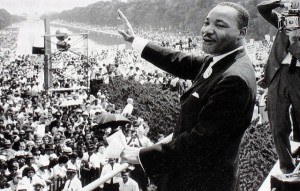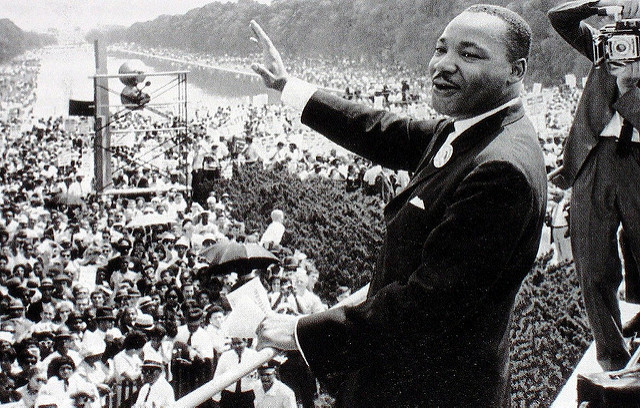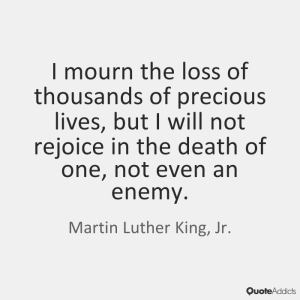>> Recently, a well-meaning individual called asking if I would speak to her group for the Martin Luther King Jr. holiday, including that someone needed to explain, “Why we had the day off.”
Recently, a well-meaning individual called asking if I would speak to her group for the Martin Luther King Jr. holiday, including that someone needed to explain, “Why we had the day off.”
Maybe she wondered why I was a little quiet at first, but she didn’t ask and I didn’t bother launching into my spiel about civil rights being a discussion-worthy topic—even if it’s not a notable leader’s holiday.
I eventually said “Yes” to the gig, but here is what I didn’t say . . .
I grew up in a family that frequently discussed what the civil rights movement looked like, both on a national and local level. It wasn’t watered down to a single page in a history book or Dr. King or his beautiful, yet overplayed “I Have a Dream” speech. My mother, uncles, aunties, and their friends lived in terror as school-aged children. They were spat on, hosed down, bullied, and threatened. One friend was shot while attempting to integrate our local school system—they considered their experiences lesser in comparison to what was going on in the rest of the nation. They also recognized plenty of present day “injustices” and reminded us that Dr. King’s “dream” would not be realized without serious efforts from future generations.
When it comes to this topic, I find myself standing on the edge of a cultural soap box . . .
But over the years, I have learned to accept that people need a holiday as a reminder of the courage, truth, justice, compassion, dignity, humility, and service that so radiantly define what we know about the civil rights movement.
So I reached out to some friends for ideas and suggestions on how we can move the conversation forward… Collectively we came up with these suggestions:
Join the “Day On” movement – Imagine if more people viewed the MLK holiday as a “day on” rather than a “day off.” Instead of simply staying at home, shopping or finally watching Selma consider a service project that strengthen communities, empower individuals, bridge barriers, and create solutions.
If you’re at a loss to find events, check out the variety of free MLK Day resources available at MLKDay.gov.
Try to relate “the dream” to something relevant – Dr. King’s dream was bigger than black and white friendships. Go beyond the cliché! Nonprofits can use some of his most inspirational speeches to start meaningful dialogue, but you don’t have to stop there. Dr. King shared a broad desire to see people triumph over poverty, racism, war and violence. Select something that conveys compassion, promotes inclusions, aligns closely with your cause, and resonates with your personal life.
Honor the women of the movement – From leading local civil rights organizations to serving as lawyers on school segregation lawsuits, women held critical roles in the civil rights movement. Yet their efforts were often overshadowed by men, who still get more attention and credit for its successes in popular historical narratives, movies and commemorations. I think women much like Ruby Nell Sales a former member of the Student Nonviolent Coordinating Committee who witnessed the murder of Jonathan Daniels, a seminary student who saved her life while registering voters in Alabama. Sales overcame psychological traumas from the racial violence she witnessed in the movement but sat down to record her story for The Museum of African American History and Culture. Sales encourages future generations to look beyond the simplistic story of Rosa Parks refusing to move to the back of the bus in Montgomery. It was her interview explaining that how Parks was a long-time activist who had sought justice for African American women who were frequently assaulted—both verbally and physically– in their daily lives that gave me insight into some of the movement’s patriarchal imperfections. “…When we look at Rosa Parks, people often think that she was – she did that because of her civil rights and wanting to sit down on the bus. But she also did that – it was a rebellion of maids, a rebellion of working class women, who were tired of boarding the buses in Montgomery, the public space, and being assaulted and called out-of-there names and abused by white bus drivers. And that’s why that Movement could hold so long. If it had just been merely a protest about riding the bus, it might have shattered. But it went to the very heart of black womanhood, and black women played a major role in sustaining that movement.”
Generate Your Own Posts, Blogs, Op-Eds –
Share a blog post or op-ed– about how your experiences with diversity and inclusion (but only if that is truly the case . . . no BS). Don’t forget to use popular hashtags like #mlk #mlkday2017
One Point of Caution– If you are using an MLK quote make sure that HE ACTUALLY SAID IT. There are several fake MLK quotes circulating on social media (QuoteAddicts and BrainyQuotes are not the most reliable sources). Some fake quotes are not so obvious.
This FAKE MLK quote was actually investigated by a CNN Reporter.
Last but not least…make a year-round commitment to inclusion– I will be writing more about this topic in the upcoming weeks for >>Nonprofit Marketing Guide. As the United States is moving toward becoming a minority-majority nation, a lack of understanding can quickly sabotage well-meaning conversations. It’s not easy talking about how factors such as race, ethnicity, religion, identity, gender, sexual orientation and language impact our day-to-day communications, but what we saw repeatedly during the recent election cycle makes me want to speak up.
Antionette Kerr is a nonprofit leader, contributing journalist and lover of poetry. After a decade of serving as an executive director, her passion for storytelling led her back into the world of nonprofit writing, consulting and publishing. She currently serves as a board member of Women AdvaNCe. Contact her at>>akerr@thewritefolks.net


There are no comments
Add yours